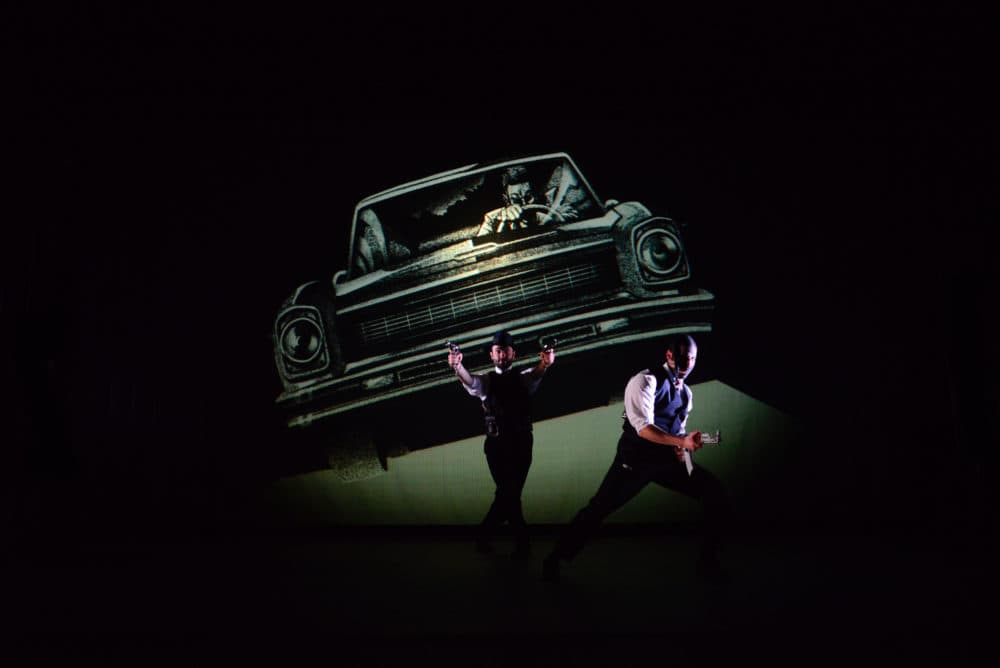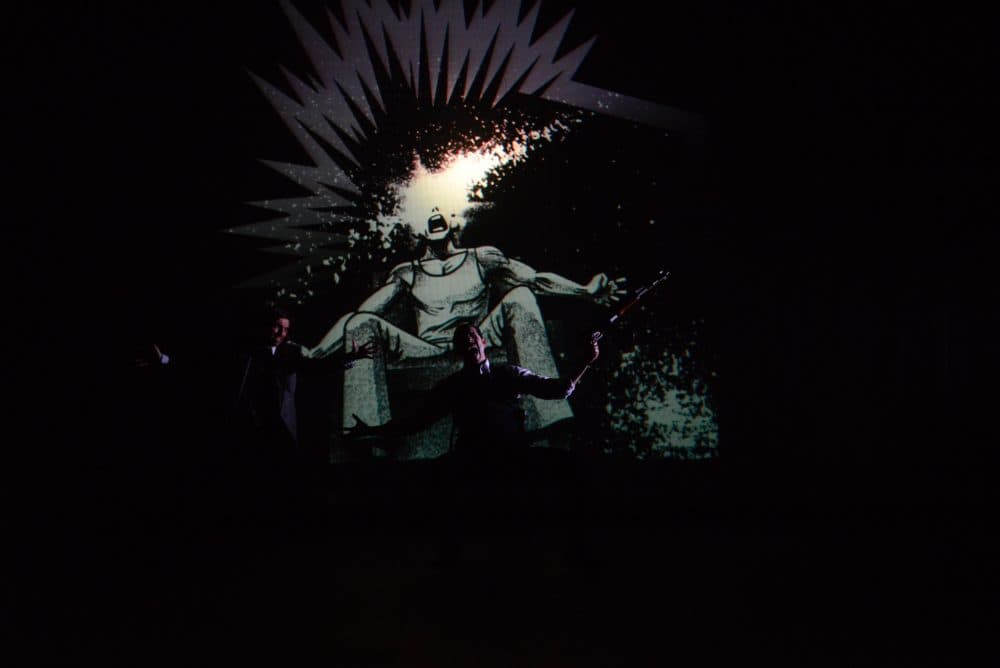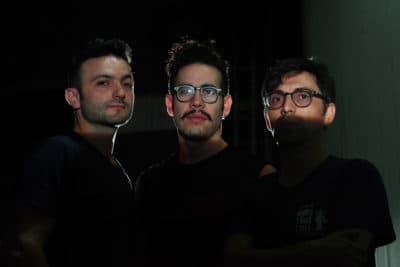Advertisement
Santiago A Mil
A Chilean Theater Company Stages A Bank Heist With Cinematic Flair
Resume
On a small stage in a darkened theater in Chile, four men reenact a bank robbery in Argentina. One actor imitates the thrumming sound of a machine gun as he aims a volley of phantom bullets. Another lies prone on the ground. Behind them on a giant screen, the scene of carnage replays in stylized black-and-white.
There are few props and almost no set pieces in this production, by the Chilean theater company Teatrocinema, of “Plata Quemada,” a bank heist noir based on a novel by the Argentine author Ricardo Piglia. Instead, projections propel the actors effortlessly through space and time. The illustrated images have the crisp, dynamic look of a graphic novel. In one scene, the robbers creep through a bank vault, which is rendered in the sketchy outline of a building schematic. As the image whirls around, the actors seem to step into the vault — even though the doorway is just a projection.
It’s January, and the final week of the annual Santiago a Mil International Festival, where Teatrocinema’s virtuosic productions are a regular feature. The company, which was founded in 2005, is famous for its blending of film, illustration and animation onstage and has toured frequently in Europe and the U.S. This production of “Plata Quemada” is destined for a Boston premiere at ArtsEmerson March 11, in Spanish with English subtitles. It will be Teatrocinema’s second time at ArtsEmerson, which commissioned and co-produced “Plata Quemada.”
The day after the January performance, director Juan Carlos Zagal paces the now-empty stage. The co-founder of Teatrocinema explains, through a translator, how the company attempts to overcome the limitations of conventional theater. In a typical play, it takes time for the actors to exit and enter, and for the stage to be reset. But in Teatrocinema’s signature style, projections immerse the characters in virtual scenery — and allow for a certain kind of freedom. “The actor can appear and disappear onscreen instantaneously, just like we do in our minds,” Zagal explains, snapping his fingers for emphasis.

The projections mean Teatrocinema can mimic film techniques like jump cuts, pans and tracking shots. Which begs the question — if the play is so much like a film, why bother putting it onstage at all? “It’s the live show,” Zagal says. “And the risk of being present.”

The risk of being present is especially palpable in "Plata Quemada," which requires non-stop intensity from its small cast. Every actor plays multiple characters, and they have to deliver dialogue in precise and uncomfortable positions — lying on the floor, for instance, or contorted around a tabletop to create the illusion that the audience is observing them from above. But the production is not without a sense of humor. Occasionally, the actors pause to critique the play, and each other. (“What’s with the music?” “I don’t know. It’s not intimate.”) There’s a self-referential quality to the projections, too. During one death scene, the screen goes black, displaying the words “no video” — a nod to the company's clever theatrical illusions, and a somber acquiescence to death’s inexpressible sorrow.
When ArtsEmerson artistic director David Dower first saw Teatrocinema a few years ago, he was impressed with more than just the company's unusual style. As much as anything, he was drawn to “the deeply processed social urgency behind all of their work,” he says.
The novel that "Plata Quemada" is adapted from was published in 1997, and it's based on a real robbery that occurred in Argentina in 1965. Yet when the production played at Santiago a Mil in January, it crackled with the energy of Chile's political present.
Since October, anti-government demonstrations have raged, as Chileans protest economic inequality and the country's failing private pension system. In that context, the violent and desperate actions of "Plata Quemada"'s characters took on a bigger meaning. “It's really about what happens in hopelessness,” Dower says. “Lives that have zero chance of anything else become curdled and anti-social.”
Zagal says the play, which pits a group of social outcasts against a corrupt police force, reflects the political issues in Chile today. He lists some of the issues at the forefront of Chile’s social crisis: “Violence, greed, corruption, capitalism and the fact that human life is despised.”
Many of the social and political problems that Chileans are protesting, like economic injustice and police brutality, are top-of-mind for Americans, too. But how Boston audiences will relate to the themes in “Plata Quemada” remains to be seen. That’s the thing about theater, and what Zagal calls “the risk of being present.”
This segment aired on March 11, 2020.

